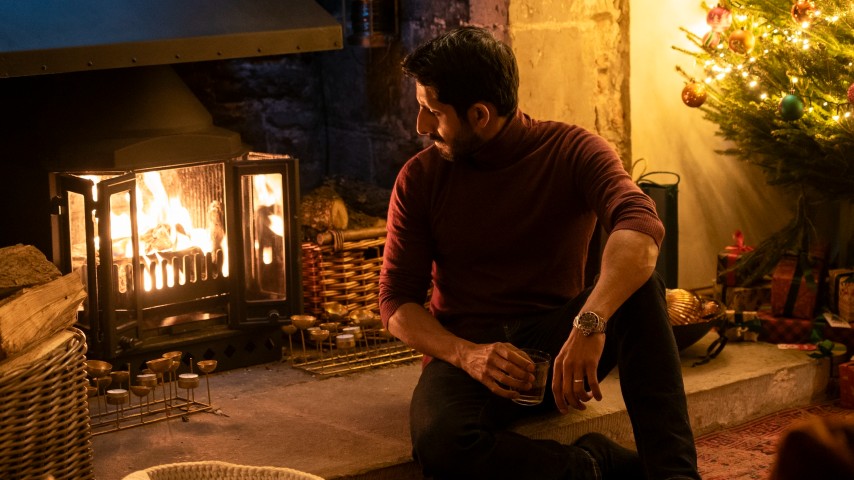Industry's Mickey Down, Konrad Kay, and Sagar Radia on this week's banger of an episode
The star of "White Mischief" and the show’s creators walk us through a thrilling, Safdies-esque hour of TV
Sagar Radia (Photo: Liam Daniel/HBO)
For much of Industry’s run, Rishi Ramdani (Sagar Radia) has served as a bit of a stock character. Exuding a chauvinist bravado that comes through in deliciously vulgar lines he spouts at his many colleagues on the Pierpoint trading floor, Rishi is the kind of scene-stealing character who delights precisely because of his mystique. Yet with every new season, and capitalizing on Ramdani’s magnetic performance, the HBO show has slowly colored in bits and pieces of the character’s backstory.
But none of that will have prepared fans for this season’s latest episode. “White Mischief” plays like a Safdie brothers’ thriller that finds Rishi’s work and life teetering on the edge of collapse. With gambling and trading debts piling up, a marriage slowly fraying at home, and an HR complaint threatening his future at Pierpoint, Rishi is a man on the verge of a nervous breakdown. The episode is a standout performance showcase for Radia and a reminder that Industry remains one of television’s most daring shows about the ways work—and capitalism at large—splinters us all into people we’d rather not become.
The A.V. Club caught up with Radia as well as co-creators Mickey Down and Konrad Kay to talk all about this Rishi-focused episode, why Industry doesn’t subscribe to the idea of the “fixed self,” what certain critiques of the show get wrong, and why lines in the episode had to be cut and re-recorded to appease HBO and the BBC.
The A.V. Club: Mickey and Konrad, I figured we’d start by talking about the title of the episode, “White Mischief.”
Mickey Down: Well, obviously we usually have the title reflect something that happens within the episode and actually pull it from the episode. They talk about the fact that Nicholas’ party where Diana lost her virginity to him was called “White Mischief,” which is actually the name of a party that someone at university had for their twenty-first. It’s also a play on Black Mischief, Evelyn Waugh’s novel, but in a really, really roundabout, kind of tone-deaf way.
We’ve also talked about this before, but I feel like Rishi is not the usual depiction of a British-Asian man on screen. He behaves in the way that white people are able to behave on TV in this episode. I mean, it’s like he’s able to basically misbehave in a way that British-Asians and, to a lesser degree, Black characters are not able to behave. And he has the lack of consequences that those characters get away with.
AVC: Sagar, what did it feel reading this script?
Sagar Radia: I remember reading it with a whole host of emotions. I think you start off feeling the inevitable fear of, “How am I gonna fucking deliver this?” And then you also try and let your confidence seep in. Like, “Okay, cool. Well, they wouldn’t give this to me if they didn’t feel I could pull it off”—while also at the same time thinking, “All right, let’s just get to work.”
Mickey touched on this: You don’t see British Asians playing these types of characters on TV or on film here. So it’s my responsibility and duty—and one I’m more than happy to take the burden of—to run with it and go, “Cool, let’s make a difference. Let’s make a mark on TV culture.”
AVC: One of the things that the episode does really well is show how Rishi seems to be boxing himself in by trying to act in a certain way. There’s complexity here because he’s sort of like an asshole but also a victim. How did you find the center for Rishi in this episode?
SR: I don’t mean to sound smart about that, but by the sheer nature of the word “complexity,” it’s complex. You’re not meant to understand it, right? I think as humans, we’re all complex. We’re multi-hyphenates. We have so many different parts to us and personalities to us. We all know how to code-switch in different environments, so inevitably, as complex as we all are, it’s not about trying to figure it out. It’s just playing what’s there. I think the worst thing you can do as an actor is to overthink it. What’s my character? What’s my this? What’s my that? It starts with the writing. If the writing’s good, the character will come naturally. And that’s the way I try to approach it.
AVC: Can we hear a little bit from the writers about overthinking all of this?
Konrad Kay: There’s definitely a lot of thinking going on. Hopefully not too much overthinking. I mean, well, it’s our job to overthink, isn’t it?
MD: Definitely. Yeah, usually what appears on the screen is maybe a tenth of what we think about the character. We try and build backstory for every character. We try and think about every moment, every motivation, every single line. We try and think about why the character is saying this. Honestly, when we came up with Rishi, he was sort of a functional character. He was a reflection of a certain kind of trader in London that felt very real, true to life, someone we’d seen a million times within our lives as people who worked in finance. He was a kind of an amalgam of people we knew. And then Sagar was so great at playing him that we thought we have to give him more in season two, so he became much more of a major character. And then in season three, we thought, “Okay, we’ve created this character who was funny and effervescent and is beautifully played by Sagar. But why is he like this? And also, how can we have him have a sort of existential crisis or identity crisis that he’s never had before? Was he born of that? Was that something he got after he left school? Was it something that he had to build up as a kind of armor against the people he worked with? Is he the perfect representation of a Pierpoint person?” All that stuff felt very interesting to us.
KK: I think what Sagar said is really true about code switching. Not to get too deep about it, but I think sometimes people criticize the show about inconsistency in character. I think they’re kind of maybe misreading it because [the show] doesn’t adhere that close to TV archetypes. The idea of a fixed self is not really a thing. There are situations and there are interactions where you will, if the writing is good and the acting is good, see how that person is a different person in front of a different audience, right?
Whenever we write an interaction between, like, Eric and Harper, or Eric and Yasmin, or Rishi and Yasmin, we always approach it with, “How would this person want to be in front of the person they’re in the scene with?” Trading floors are really like this. And maybe all of life is like this. You’re always performing to your wife, you’re performing to your parents…but on a trading floor, all of that stuff is super dialed up.
I think the show is quite interested in identity. I mean, this is very obvious: what people are like at work versus what they’re like at home. And due to that sort of disconnect, you have people like Harper and Yasmin and you wonder, “How is that friendship even possible? Because do they truly know each other?” And as the season goes on, I think you can probably make the case that they do actually know each other very intimately, and that’s part of the pain of them not being able to connect.

Sagar Radia (Photo: Nick Strasburg/HBO)
AVC: To that point, Sagar, was there a specific scene that felt particularly challenging?
SR: The first one that comes to mind is probably the argument in the kitchen with his wife. I think that’s when it’s all come to a head. There’s so many questions that have gone through his mind. He’s obviously lost the money. He’s deep, deep, deep in that hole. He doesn’t really know where he’s going from there. But that’s the moment when he starts to really address and question who he is and the type of man he wants to be. You know, she sort of calls him out on it. There’s the line about fixing broken men and raising…
AVC: “It’s easier to raise strong boys than to fix broken men.”
SR: Exactly, perfect! And that’s the one that stands out. That’s the moment when the ball drops for him, and he kind of starts to address everything that has gone before and who he wants to be now going forward. And then when they go to bed, the the energy of the argument has has calmed down. And they’re having a more of an intimate moment, and he does start to question the type of man he is and wants to be, whether that’s as a husband, as a father, or as a trader.
AVC: I’m glad you brought up that line up because it strikes me as the key to the episode. I also love, “Your shame is not helpful right now,” which is just an amazing line.
MD: You play that bit really beautifully, Sagar. It’s very hard to tell whether you’re being genuine. Like, you cry and you’re like, “I’m so ashamed.” And then straight away, you’re like, “Actually, you know, is there a way that you can get me out of this?” And it’s really hard to tell whether you’re being sincere or not, which is why we love that bit. Is that shame real? Is that shame lasting? Does that shame actually come from the place of depth, or is it, again, a performance?
KK: That run of scenes from when the plates get thrown at you to you going down on her, I think, is some of the best acting you’ve done. There’s a shitload of different emotions in it, including what Mickey just picked up on, which is a kind of self pity—like, “How can I maximize the situation for myself?”—which is a bit sick.
SR: I think one of the descriptions of Rishi that doesn’t come up as often, which actually speaks to what Mickey’s just said, is he’s still a very hopeful person in life. He’s very positive. He looks at the positives of life all the time, because whatever shit he gets himself into, he genuinely believes he can get himself out of it. Whether that’s fake or not, you have a hope inside that you can do it, right? Regardless of the deepest hole he gets himself into, there’s still hope. He still believes there’s always hope to get out of it.
KK: That’s just the characteristic of a general gambler. One more spin, and I’ll make it all back!
AVC: We have to talk about Overheard@Pierpoint. How fun was it to write all those lines?
MD: We sort of joke about the fact that Rishi is just an opportunity to write the kind of stuff you cannot write on TV today. It’s like a valve being released, and we can put it in the character, who is the only person, for some reason, who can get away with it. It was quite fun writing them. I mean, some of them are things that, anecdotally, I’ve heard people say before.
KK: We have a few trading floor-mates who are quite like Rishi, who sometimes send us stuff they’ve heard on trading floors, which we slightly plagiarize. Actually, you know what we do? We just punch them up. We make them funnier. We’re like, “That’s quite a good joke. How do we make it a really blue joke?” And that’s where we land. We actually hit our own brick wall with ADR this season, because it’s the first time BBC and HBO both colluded to get stuff removed, which has never happened before.
MD: We basically pulled some of them out from the mix at the last minute, because they were just like, “We can’t hear this,” which is fair enough.
KK: It was a bit of a sad shame to lose them because they were some great lines. But, especially for the BBC, they were too close to a couple of recent scandals. They didn’t want to bring it up again.

Konrad Kay and Mickey Down in London in 2024 (Photo: Jed Cullen/Dave Benett/Getty Images)
AVC: For American audiences watching, I wanted to talk about cricket and its function here with regards to Rishi, who finds himself owning and then destroying a cricket pavilion.
KK: Well, I mean, I’m gonna sound like Ricky Gervais in that podcast he did about England years ago or something. There’s an image in the mind’s eye of “Englishness,” which is kind of bucolic, pastoral, tea, cricket pavilions, cricket lawns, morning mists. It’s an idea of a countryside in a village which, you know, still, of course, exists between various metropolises in this country and still is a very vibrant thing that is definitely there and present. But I think we were trying to tap into that smore poetic version of a kind of lost country. I’m talking bollocks a bit, but Mick…
MD: It’s a microcosm of what Rishi does throughout the episode: assimilate but also overpower. I don’t think we’ve spoken about Rishi before as a character who’s never really taken a moment to think about where he came from. He’s just about moving forward all the time—whether he’s moving forward in his career, moving forward in his life, moving forward accruing material stuff and wealth. I think he thinks of himself as an Englishman. And he thinks, “Okay, well, I’m an Englishman living in the countryside. My children are English. I’m English. And I’m gonna push very gently against the things that I see wrong with it. But I’m also gonna step back when people tell me that I shouldn’t be pushing.” The irony is that it’s his discussions with his wife that actually push him towards making a stand. Like, “I’m not gonna stand for this anymore. I actually don’t have to bend towards these people at all. I think they should probably bend towards me.” That can be a triumphant moment though can also be a moment of damning, because it’s the drive and the fire that makes him call Vinnay at the end and say, “Look, I’m gonna put another bet.” Because it’s actually him pumping himself up. Again.
KK: Cricket is also a massive colonial export, right? All of the best cricketing nations in the world are former English colonies—the West Indies, Australia, India. So that resonance is obviously massive as well.
SR: I never thought about that. Actually, I don’t know if that aspect of cricket and India would go over their heads, because I don’t know how familiar they are with cricket in general. Like, cricket in India is the biggest sport. The cricketers are treated like gods over there. They are literally as high as God and movie stars over there. It’s crazy.
AVC: Sagar, as a closer, I wanted to ask you a little bit about the reception to Rishi in the first two seasons. I’m curious what it is you most hear from fans.
SR: “We love your background lines”—which I don’t know if I should be offended about or…
MD: [Laughs] When you’re not on camera?
SR: [Laughs] “We love it when you’re not on screen!” But you know what? I was surprised. And I don’t know if the boys think this or would admit this, but in season one, there was an almost aspirational aspect to it, because he’s very rich and doesn’t give a shit about anyone’s opinion. And I think to an extent, everybody vies for that in some way. You know, you want to not feel like you’re being judged. Rishi does not care about what people think about him. And I think people sort of took to it to be like, “Man, if I can take a little bit of that, then I’m good.”
And then in season two, you get to flesh it out a little bit more, and you see more of that trading-floor bravado that he brings and skill as well. I think we ignore how good he actually is at his job. It doesn’t really come up too often, but he’s fantastic at what he does first and foremost. So the reception has been amazing, more than I could have ever imagined. Actually, it’s a risk going into episode four. Because he’s so beloved that part of you doesn’t want to ruin that.
MD: So funny. Like, “Oh, he’s competent! He doesn’t give a shit!” And then in season three, we’re like, “Oh, he’s an insecure, fucked-up bro and bad at his job!”